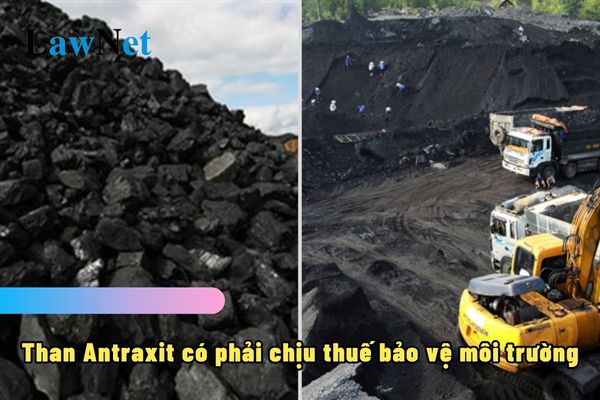Is anthracite coal subject to environmental protection tax in Vietnam? How much is the environmental protection tax on anthracite coal in Vietnam?
Is anthracite coal subject to environmental protection tax in Vietnam?
The subjects subject to environmental protection tax are stipulated in Article 3 of the Environmental Protection Tax Law 2010 as follows:
Subjects to tax
1. Gasoline, oils, lubricants, including:
a) Gasoline, excluding ethanol;
b) Jet fuel;
c) Diesel oil;
d) Kerosene;
đ) Fuel oil;
e) Lubricant oil;
g) Lubricant grease.
2. Coal, including:
a) Lignite;
b) Anthracite coal;
c) Coking coal;
d) Other types of coal.
3. Solution of hydro-chloro-fluoro-carbon (HCFC).
4. Plastic bags subject to tax.
5. Herbicides subject to restricted use.
6. Termite pesticides subject to restricted use.
7. Wood preservation chemicals subject to restricted use.
8. Warehouse disinfectants subject to restricted use.
9. If it is deemed necessary to supplement other subjects subject to tax to suit each period, the Standing Committee of the National Assembly shall consider and provide regulations.
The Government of Vietnam specifies the details of this Article.
Hence, anthracite coal is one of the subjects to environmental protection tax and therefore will be subject to tax.

Is anthracite coal subject to environmental protection tax in Vietnam? How much is the environmental protection tax on anthracite coal in Vietnam? (Image from the Internet)
How is the environmental protection tax on anthracite coal calculated in Vietnam?
Based on Article 4 of Circular 152/2011/TT-BTC, the formula for calculating the environmental protection tax on anthracite coal is determined as follows:
| Environmental Protection Tax to be paid | = | Quantity of taxable goods | x | Fixed tax rate per unit of goods |
What are the bases for calculating the environmental protection tax on anthracite coal in Vietnam?
According to Article 6 of the Environmental Protection Tax Law 2010, the basis for calculating the environmental protection tax on imported goods is as follows:
Basis for calculation
1. The basis for calculating environmental protection tax is the quantity of taxable goods and the fixed tax rate.
2. The quantity of taxable goods is regulated as follows:
a) For domestically produced goods, the quantity of taxable goods is the quantity of goods produced for sale, exchange, internal consumption, or gifting;
b) For imported goods, the quantity of taxable goods is the quantity of imported goods.
3. The fixed tax rate for calculating the tax is stipulated in Article 8 of this Law.
Simultaneously, Article 5 of Circular 152/2011/TT-BTC also stipulates the basis for calculating the environmental protection tax applicable to imported goods as follows:
Basis for calculation
The basis for calculating environmental protection tax is the quantity of taxable goods and the fixed tax rate.
1. The quantity of taxable goods is regulated as follows:
1.1. For domestically produced goods, the quantity of taxable goods is the quantity of goods produced for sale, exchange, internal consumption, gifting, promotion, advertisement.
1.2. For imported goods, the quantity of taxable goods is the quantity of imported goods.
In cases where the quantity of goods subject to environmental protection tax for export, sale, and import is measured in units different from the units specified for tax calculation in the environmental protection tax schedule issued by the Standing Committee of the National Assembly, conversion to the measurement unit specified in the environmental protection tax schedule for tax calculation is required.
1.3. For fuel mixtures containing fossil gasoline, oils, lubricant grease, and biofuels, the quantity of taxable goods in the period is the quantity of fossil gasoline, oils, lubricant grease in the quantity of mixed fuel imported or produced for sale, exchange, gifting, or internal consumption, converted to the measurement unit specified for tax calculation of the corresponding goods. The determination method is as follows:
...
Regarding the time to start calculating the environmental protection tax applicable to imported lubricant grease, it is based on Article 9 of the Environmental Protection Tax Law 2010 regarding the time for calculating environmental protection tax as follows:
Time for calculation
1. For goods produced for sale, exchange, gifting, the time for tax calculation is the time of transfer of ownership or use rights of the goods.
2. For goods produced for internal consumption, the time for tax calculation is the time when the goods are put into use.
3. For imported goods, the time for tax calculation is the time of customs declaration registration.
4. For gasoline and oil produced or imported for sale, the time for tax calculation is the time the gasoline and oil businesses sell their products.
For imported goods, the time for tax calculation is the time of customs declaration registration.
Thus, according to the above regulations, the quantity of imported lubricant grease, the basis is on the quantity of imported lubricant grease for calculating the environmental protection tax.
*Note: In cases where the quantity of goods subject to environmental protection tax for export, sale, and import is measured in units different from the units specified for tax calculation in the environmental protection tax schedule issued by the Standing Committee of the National Assembly, conversion to the measurement unit specified in the environmental protection tax schedule for tax calculation is required.
What is the environmental protection tax on anthracite coal in Vietnam?
Based on the tax bracket table stipulated in Article 8 of the Environmental Protection Tax Law 2010, the current fixed tax rate on coal is specified as follows:
- Lignite: 10,000-30,000 VND/ton;
- Anthracite: 20,000-50,000 VND/ton;
- Coking coal: 10,000-30,000 VND/ton;
- Other types of coal: 10,000-30,000 VND/ton.
Thus, according to the regulation, the environmental protection tax on anthracite coal is 20,000-50,000 VND/ton.

